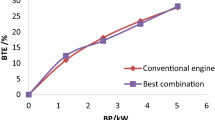Abstract
Nowadays, increasing energy demand and environmental and air pollution issues have spread the use of alternative fuels such as biodiesel in diesel engines. While the advantages of biodiesel that are comparable to petroleum-based diesel fuels and low unburned HC, carbon monoxide and smoke (soot) emissions make the use of this fuel environmentally significant; high NOx emissions are still a problem to be solved. The formation of decreased smoke reducing radiative heat transfer from combustion chamber in biodiesel engines and increase in formation of NOx due to rise in flame temperature are among the reasons reported for high NOx in the literature. In this study, in a diesel engine using biodiesel, soot emissions produced by petroleum diesel fuel were reduced to biodiesel level by using metallic additive (Ba), and NOx emissions were compared. When the amount of Ba in the fuel was increased, there was a significant decrease in the smoke emissions, but in this case, NOx emissions decreased slightly, while they were expected to increase. When NOx emissions of diesel and biodiesel were compared for the same or similar smoke emissions, it was seen that high NOx emissions were achieved with biodiesel. As a result, although Ba additive reduced smoke emissions, it was seen that its effect on NOx formation was not very clear.
Graphic abstract





Similar content being viewed by others
Abbreviations
- ASTM:
-
American Society of Testing and Materials
- Ba:
-
Barium
- CO:
-
Carbon monoxide
- HC:
-
Hydrocarbon
- EN:
-
European norms
- FBC:
-
Fuel-borne catalysts
- FTIR:
-
Fourier transform infrared
- NO:
-
Nitrogen oxide
- NOx :
-
Nitrous oxide
- NO2 :
-
Nitrogen dioxide
- PM:
-
Particulate matter
- SEC:
-
Specific energy consumption
- SFC:
-
Specific fuel consumption
- ULSD:
-
Ultra-low sulfur diesel
- D:
-
100% diesel
- D25Ba:
-
0.25% Ba + D
- D50Ba:
-
0.50% Ba + D
- D100Ba:
-
1% Ba + D
- B:
-
100% biodiesel
- UHC:
-
Unburned hydrocarbon
References
Altun Ş (2014) Effect of the degree of unsaturation of biodiesel fuels on the exhaust emissions of a diesel power generator. Fuel 117:450–457. https://doi.org/10.1016/j.fuel.2013.09.028
Altun Ş, Lapuerta M (2014) Properties and emission indicators of biodiesel fuels obtained from waste oils from the Turkish industry. Fuel 128:288–295. https://doi.org/10.1016/j.fuel.2014.03.024
Ashok A, Kennedy LJ, Vijaya JJ, Aruldoss U (2018) Optimization of biodiesel production from waste cooking oil by magnesium oxide nanocatalyst synthesized using coprecipitation method. Clean Technol Environ Policy 20:1219–1231. https://doi.org/10.1007/s10098-018-1547-x
Appendix E Portable Diesel Engine Emission Control Technology. https://www.arb.ca.gov/regact/porteng/appe.pdf Accessed 21 Dec 2019
Cheng AS, Upatnieks A, Mueller C (2006) Investigation of the impact of biodiesel fuelling on NOx emissions using an optical direct injection diesel engine. Int J Engine Res 7:297–318. https://doi.org/10.1243/14680874JER05005
Directive E (1999) Council Directive 99/74/EC of 19 July 1999 laying down minimum standards for the protection of laying hens. Off J Eur Commun 203:53–57
Draper WM, Phillips J, Zeller HW (1988) Impact of a barium fuel additive on the mutagenicity and polycyclic aromatic hydrocarbon content of diesel exhaust particulate emissions. SAE Techn Pap. https://doi.org/10.4271/881651
Hoekman SK, Robbins C (2012) Review of the effects of biodiesel on NOx emissions. Fuel Process Technol 96:237–249. https://doi.org/10.1016/j.fuproc.2011.12.036
Korotney D (2002) A comprehensive analysis of biodiesel impacts on exhaust emissions draft technical report, vol EPA 420P-02-001. United States Environmental Protection Agency
Lapuerta M, Armas O, Rodriguez-Fernandez J (2008) Effect of biodiesel fuels on diesel engine emissions. Prog Energy Combust Sci 34:198–223. https://doi.org/10.1016/j.pecs.2007.07.001
Mueller CJ, Boehman AL, Martin GC (2009) An experimental investigation of the origin of increased NOx emissions when fueling a heavy-duty compression-ignition engine with soy biodiesel. SAE Int J Fuels Lubr 2:789–816
Nanthagopal K, Ashok B, Kishna RS, Srinath R, Kumar MP, Karthickeyan V (2020) Experimental investigation on engine parameters variation in common rail direct injection engine fueled with biodiesel. Clean Technol Environ Policy 22:459–479. https://doi.org/10.1007/s10098-019-01796-9
Norman GR (1966) A new approach to diesel smoke suppression. SAE Techn Pap. https://doi.org/10.4271/660339
Ravichandra D, Puli RK, Chandramohan V (2019) A review report on turbocharged diesel engine with alternative fuels. J Inst Eng (India): Mech Eng Div 100(6):1043–1052. https://doi.org/10.1007/s40032-019-00510-4
Sayin C, Gumus M (2011) Impact of compression ratio and injection parameters on the performance and emissions of a DI diesel engine fueled with biodiesel-blended diesel fuel. Appl Therm Eng 31:3182–3188. https://doi.org/10.1016/j.applthermaleng.2011.05.044
Song H (2012) Investigation on nitric oxide and soot of biodiesel and conventional diesel using a medium duty diesel engine. Texas A & M University, College Station
Song H, Jacobs TJ (2014) The influence of soot radiation on NO emission in practical biodiesel combustion. Fuel 128:281–287. https://doi.org/10.1016/j.fuel.2014.03.027
Shameer PM, Ramesh K, Sakthivel R, Purnachandran R (2017) Effects of fuel injection parameters on emission characteristics of diesel engines operating on various biodiesel: a review. Renew Sustain Energy Rev 67:1267–1281. https://doi.org/10.1016/j.rser.2016.09.117
Truex TJ, Pierson WR, McKee DE, Shelef M, Baker RE (1980) Effects of barium fuel additive and fuel sulfur level on diesel particulate emissions. Environ Sci Technol 14:1121–1124. https://doi.org/10.1021/es60169a018
Yasar F, Altun S, Adin H (2011) Fuel properties of biodiesels produced from blends of canola oil and animal tallow. Energy Educ Sci Technol Part A Energy Sci Res 27:199–208
Zhang Y, Boehman AL (2007) Impact of biodiesel on NOx emissions in a common rail direct injection diesel engine. Energy Fuels 21:2003–2012. https://doi.org/10.1021/ef0700073
Funding
None.
Author information
Authors and Affiliations
Corresponding author
Ethics declarations
Conflict of interest
The authors declare that there are no conflict of interest.
Additional information
Publisher's Note
Springer Nature remains neutral with regard to jurisdictional claims in published maps and institutional affiliations.
Rights and permissions
About this article
Cite this article
Arca Bati, Z., Altun, S. Investigation of the effect of barium-based additive on smoke and NOx emissions of a diesel engine fueled with conventional and biodiesel fuels. Clean Techn Environ Policy 22, 1285–1295 (2020). https://doi.org/10.1007/s10098-020-01869-0
Received:
Accepted:
Published:
Issue Date:
DOI: https://doi.org/10.1007/s10098-020-01869-0




